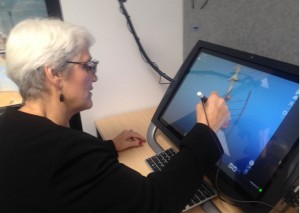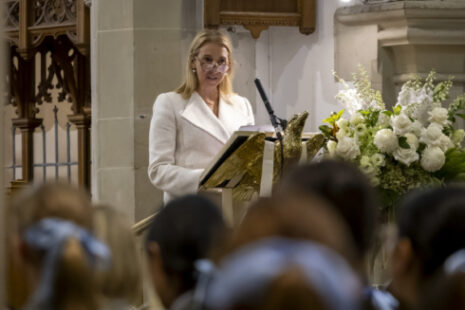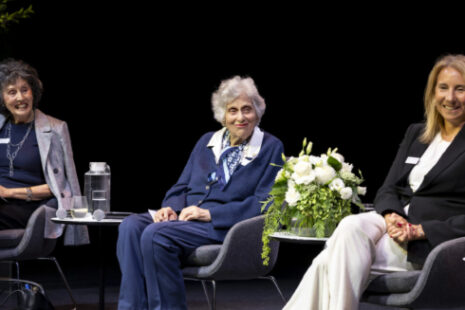Confidence in Mathematics Higher in Girls’ Schools

Many parents may have read the article in The Age on Friday 5 August highlighting the benefits of an all-girls’ school building confidence in Mathematics and Science. The comprehensive study has found that girls at single-sex schools grew more confident in Mathematics than those in co-educational schools.
The study compared the attitude and achievement of girls and boys at both single-sex and co-educational schools for the same level of achievement. It found that in Year 4, boys were more confident in their Mathematic abilities than girls in co-educational schools. The confidence gap increased significantly by the time the students commenced Year 8, with the top male students proving far more confident than female students, even if their ability was on par. The author of these findings, Dr Chris Ryan said the trend reversed at single-sex schools, proving that a negative attitude to Mathematics was not ‘intrinsic’ to female students but was rather a product of the co-educational school environment.
Girls’ schools are believed to offer an environment where girls are more confident and willing to take risks, make mistakes, ask questions and compete. St Catherine’s remains committed to fostering a love of Mathematics and Science from the Junior School through to the Senior years. The introduction of the PRIME Maths Program in Barbreck last year has lifted the rigour of the Mathematics learned in the Junior years with confidence notably higher amongst students after two years.
Through August, St Catherine’s staff have engaged in a range of professional learning opportunities related to Mathematics and Science. On Friday 5 August, Associate Director of the National STEM Learning Centre and Network in the UK, Ms Hoyle addressed staff about the professional training, career trends and funding of STEM education in the UK. Hoyle also presented at the Australian Council for Educational Research (ACER) National Conference in Brisbane this week, and as such, I was very appreciative that she also accepted an invitation by Mr Adrian Puckering (St Catherine’s Director of Curriculum Innovation and Development) to include St Catherine’s on her speaking schedule.
As the Associate Director of STEM Learning, Hoyle oversees the organisation that provides continuing professional development in STEM across the UK. She manages the National Science Learning Network including the National Science Learning Centre in York and over 50 Science Learning Partnerships, the National STEM Centre and a range of other government and employer funded CPD programmes supporting STEM education.
Hoyle highlights a common issue across Europe and the UK which vexes governments, employers and educationalists – the need for more young people to choose to study STEM subjects, become graduates in STEM subjects and then take up STEM careers.
In addition there is an urgent need for more STEM skills in the total workforce. “Science is changing so quickly, and this must reflect our commitment as educators to provide opportunities in order for girls to go into future pathways in STEM,” Hoyle explains.
Hoyle highlighted her understanding that the most sought after skills in the STEM area include effective collaboration, curiosity in problem solving and efficacious communication, in addition to being adaptable, flexible learners.
Hoyle describes an interest in STEM is only one factor in inspiring students. She explains that schools must not only talk about careers in STEM but also the skills and qualities of the roles themselves. Girls, as described by Hoyle, are associated in the extrinsic values of STEM, and showcasing this, for example highlighting salaries, will encourage their ‘buy-in’.
A commitment to ongoing professional development for teachers, developing authentic experiences, building career awareness and enabling access to experts for both teachers and students is essential. Over the past three years, St Catherine’s has partnered with the Epworth Hospital to enable opportunities for our Senior Science students to participate in surgical workshops alongside resident doctors, theatre nurses and surgeons. This access to experts and building career awareness is an example of what Hoyle is describing. Hoyle also encourages garnering such partnerships through parent networks, such as our partnership with the Epworth Hospital, successfully created with the assistance of Year 12 parents, Dr Larissa Roeske and Mr Frank Chen.
This Friday, the second annual Festival of Better Learning and Teaching hosted by St Catherine’s will provide our staff and teachers from over 20 independent schools with an outstanding professional learning opportunity. The three keynote speakers and a full range of educational workshops will showcase the current thinking in educational circles across a range of interest areas.
Today, I am particularly looking forward to hearing the keynote address from Dan Haesler, an internationally known and respected speaker and educational expert on issues of engagement, wellbeing, mindset and leadership. Dan has shared the same stage as luminaries such as Sir Ken Robinson, Sugata Mitra and His Holiness the Dalai Lama, as well as regularly featuring in the media and writing a monthly column in The Australian Teacher Magazine.
Dr Jenine Beekhuyzen, Adjunct Professor at Griffith University, UN Ambassador and Founder of Tech Movement for Girls will also speak at the Festival. The Tech Girls Movement aims to inspire young girls into technology careers and also to educate their parents and teachers about tech careers with others. Associate Professor Matthew Riddle, Director of the Educational Innovation Department at La Trobe University will deliver the closing keynote address on ‘Educational Innovation’.
I look forward to the Festival and continuing St Catherine’s strong tradition of continued professional development of our staff for the benefit of our students.






